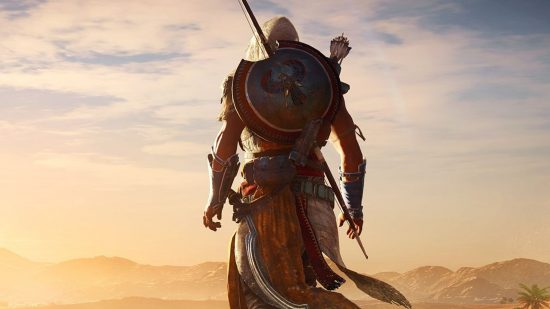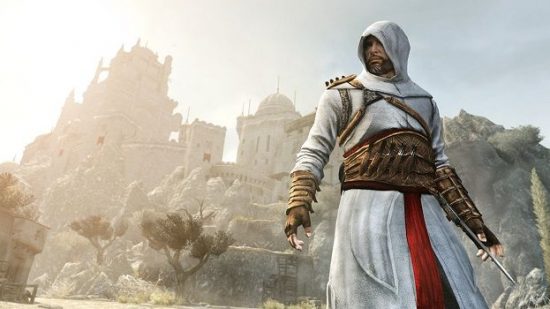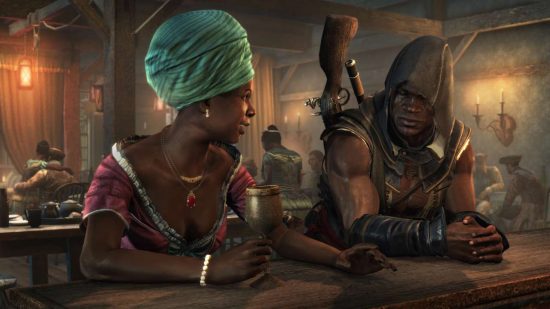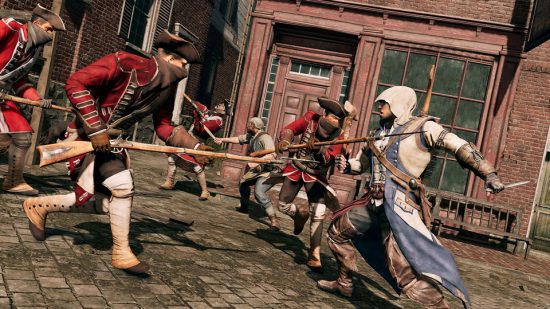It looks as though the next instalment in Ubisoft’s ongoing saga of strife and conquest will take place in Baghdad, not Mesoamerica as was originally rumoured. The Assassin’s Creed saga began in the Middle East – with Altaïr hopping between the cities of Masyaf, Jerusalem, Acre, and Damascus – and I’m glad we’re going back. But I couldn’t help but get excited by the prospect of a Mesoamerican story.
As a historian, it goes without saying that I have a complicated relationship with the Assassin’s Creed games (if we were a Facebook couple, that’s what it would say). Ubisoft’s RPG series doesn’t irritate me anywhere near as much as the historical revisionism that runs rampant through Activision’s Call of Duty, but I have always remained somewhat sceptical of its treatment of the past – while still greedily devouring them anyway. The recent trilogy of Assassin’s Creed games have, on the whole, done better than their predecessors in faithfully recreating the past, casting out some of the laboured alt-history that saw Da Vinci acting as the Creed’s version of Q, and instead focusing on the cultures, communities, and everyday hardships behind each of its settings.
While my Assassin’s Creed journey ended with Syndicate (I grew tired of feeling like I was playing the same game only with which felt a little too much like Second Industrial Revolution reskin of the thoroughly lacklustre Unity) I’d be lying if I said that Origins and Odyssey didn’t catch my interest with their ancient settings. With antiquity now being the focus, Assassin’s Creed is exploring regions and time periods often consigned to school textbooks in new, dynamic ways – and it’s threatening to pull me, kicking and screaming, back in.
Imagine my face, then, when rumours began to swirl that the next temporal destination was going to be Mesoamerica, a culture I’ve been fascinated with for years, and studied in great depth during my career in history.
That rumour was crushed by Bloomberg’s Jason Schreier, who suggests the next instalment of the classic saga will take place in Baghdad at roughly the same time as the events of Valhalla.
The Discovery Tour educational modes, which strip away combat and fill the world with thematic history tours, boast more insight into what life was like at the time than you could ever hope to pick up at a museum. And if there’s any setting that could benefit from a more coherent and considered mainstream depiction, it’s Mesoamerica.
A JUNGLE FANTASY
The Assassin’s Creed series does a pretty good job of recreating the shining metropolises of the past, but so far they’ve all been historical recreations that we’re relatively familiar with.
One of the most alluring aspects of Black Flag was the naval aspect, allowing players to explore the vast expanse of the Caribbean at their leisure. From the bustle of Kingston to the distinct lawlessness you feel scaling buildings and waving the pirate flag; Black Flag felt completely different because the atmosphere bred excitement – you felt like you were on the run, or that the characters around you were real, fleshed out virtual human beings. Similarly, Valhalla’s frosty open world recreation of 9th-century England revelled in the mysticism and grim folklore of the setting.
What we haven’t seen, though, is a full-fledged jungle setting, which is a location in which the titular assassins would thrive. With an abundance of foliage to use as camouflage, trees to scale, and crevices to hide in, your target wouldn’t stand a chance.
Aside from its spectacular scenery and the environment being perfectly suited for stealthy hunters, the Mesoamerican world has plenty of other unique hurdles for players to navigate. When the Spanish conquest of the Americas began around the 16th century, there were hundreds of native peoples as well as several minor and major empires spanning the region. Approaching different populations and learning their customs – or how to pass by them undetected – could become a key part of progression, not to mention an organic way of showcasing the abundance and richness of Mesoamerican cultures, rather than a world in which Aztecs battle against Spanish conquistadores. Just make sure you don’t use the wrong customs with the wrong people and end up as a human sacrifice, though.
Maya and Aztec gold has also become synonymous with the region (882 pieces of Aztec gold come to mind, anyone?), so imagine wading through the lush foliage in search of ancient prizes – although, with the rebooted series’ willingness to embrace folklore and myth, you might need to prove yourself to the divine Quetzal (also known as the “feathered snake”) to claim them for yourself. In the same vein, a Mesoamerican Assassin’s Creed could introduce us to a variety of fantastical beings, ranging from vampiric shapeshifting turkeys (see: Tlahuelpuchi) to ‘water dogs’ that sink fishing boats and grab people from the water’s edge (Ahuizotl).
For minigames, the mysterious Mesoamerican ball game is perhaps the most obvious candidate. Given that the exact rules of this game are unknown, there’s plenty of room for interpretation here, but the assumed basics are that two teams compete to score the most goals by knocking a solid rubber ball around an arena – usually with their hips, sometimes with racquets or bats. If any of that seems too low-stakes, then there’s plenty of evidence that the losing team would be sacrificed. Even if your team won, there are accounts of players being killed when the ball hit them in the head or even stomach, so it’s hardly risk-free.
Learning to use drums and other musical instruments would also be a good new side profession, especially given that music was played at everything from funerals to battles. Or you could try earning some extra money by betting on or playing popular dice game Patolli.
I could list a thousand things that I’d like to explore in a Mesoamerican Assassin’s Creed, but I mostly just want to experience a reimagined version of an oft-forgotten and misrepresented culture first hand – especially because I based my entire university career on conflict history and the impacts on warfare on society.
GRAPPLING WITH UNPLEASANT PASTS
A Mesoamerican setting doesn’t just provide a unique environment for players to explore, it represents a rare opportunity to address difficult historical topics in videogame form.
I wrote my entire Masters thesis on how the videogame industry has an unfortunate habit of shying away from disturbing historical topics. There are thousands of World War II games, but few talk about the Holocaust, for example. While I understand that for many, games are supposed to be fun, we’re moving into a world where virtual media has become a device of education and storytelling.
The Aztecs and other native peoples whose cultures and empires were felled at the hands of the Spanish conquistadores are rarely explored in popular culture – a game that captures not just their conflict, but more importantly their culture, and allows players to live it from their perspective could be an important resource for learning. We’ve seen so few games focus on the colonial period, mostly because it’s a part of history many would rather forget, but Assassin’s Creed hasn’t shied away from this in the past, as evidenced by Black Flag and Freedom Cry.
A Mesoamerican AC game could shine a light on a period in history during which 90% of native populations were wiped out by Eurasian diseases and entire cultures were lost as a result of both internal warfare and external colonial forces. Some of the world’s most interesting, unique civilisations were stomped out in the blink of an eye, and their histories were broadly overwritten by the victors. It would allow us to better understand the cultures and civilisations that were destroyed through colonisation, in a form that’s relevant to young players, while potentially highlighting the contemporary hangovers of colonialism in the process.
A Golden Empire
It’s no secret that, despite its remaster, Assassin’s Creed III remains one of the series’ least impressive games. Set amid the smog of the American Revolution, it was a far cry from the theatres of the Third Crusade and Renaissance Florence – and not a particularly welcome one. In fact, Ubisoft has even decided to close the game’s multiplayer servers (alongside Brotherhood and Revelations), leading to Assassin’s Creed fans hosting a virtual funeral.
Black Flag was a much better crack at the American setting, but the environment felt second to the lively cast of characters and intense naval combat. A Mesoamerican setting would explore an entirely fresh continent and open up all that this glorious region has to offer – it’s just unfortunate that it looks like we won’t be seeing it.
Going back to the Middle East makes sense; the Baghdad of 800 AD was the site of a technological revolution, and one of the most important parts of the Islamic world at the time. It was the envy of Western civilisation, rivalling the likes of the Greeks and Romans, and was renowned for both its inventions, and its ability to adapt and grow. It ticks all of the boxes for a classic Assassin’s Creed entry, and it’s pretty close to where our story began – and who doesn’t love a good bit of nostalgia?
The thing is, I don’t want another safe entry. I want to see something new and innovative – a Mesoamerican game would do that.
At its core, Assassin’s Creed is an endeavour to create engaging historical stories that not only represent the time period itself, but the people and cultures that made these time periods so memorable – just as it has done with the Middle East, Egypt, and Greece.
Mesoamerica has been confined to the history books for too long; we need to tell the stories of those who suffered, and shine a light on one of the most catastrophic events in human history – make more than a game, Ubisoft, make history.



